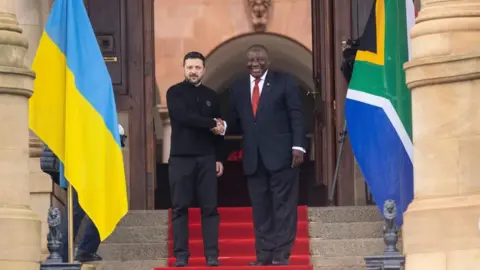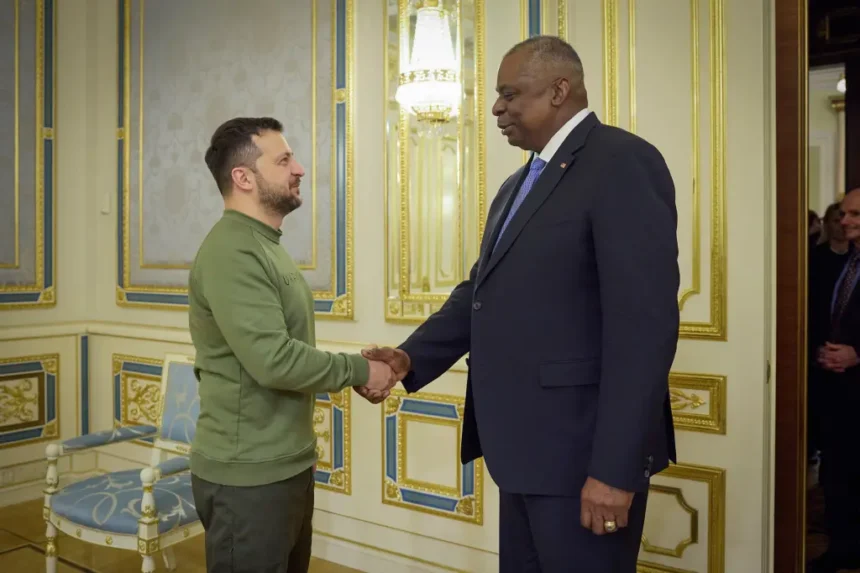Ukrainian President Volodymyr Zelensky has cut short his first visit to South Africa following a devastating Russian missile and drone strike on the Ukrainian capital of Kyiv that resulted in significant casualties.

At least eight people were killed, and over 80 others were injured, including children, during the overnight attack. Local officials report that there was significant destruction across the city, and rescue operations are ongoing.
Zelensky, who had been in South Africa to strengthen diplomatic ties and counter Russia’s growing influence in Africa, announced on X (formerly Twitter) that he would return to Ukraine immediately after meeting with South African President Cyril Ramaphosa to continue his peace and diplomatic efforts. “The strikes must be stopped immediately and unconditionally,” Zelensky wrote, referring to an earlier ceasefire agreement.
Diplomatic Shift: Ukraine and South Africa’s Changing Relations

When Zelensky first arrived in South Africa, his visit marked a notable diplomatic shift. Just two years ago, South African leaders, including Ramaphosa, had visited Kyiv on a self-styled peace mission, but at that time, South Africa’s refusal to condemn Russia’s invasion of Ukraine strained relations with Kyiv.
However, the geopolitical landscape has since shifted. Both Ukraine and South Africa now find themselves increasingly at odds with the United States. South Africa, in particular, has suffered strained relations with Washington, including the expulsion of its ambassador and the removal of significant aid funding.
South Africa’s non-aligned stance has positioned it as a potential mediator in bringing about a peace deal with Russia, despite Russia’s ongoing occupation of Crimea and other territories seized during the war. Both countries are now seeking new international partnerships—Ukraine to broaden its diplomatic outreach, particularly in Africa, and South Africa to assert itself as an independent player in global politics.
Ukraine’s Stance on Crimea and Peace Talks
In recent statements, Zelensky made it clear that Ukraine would not concede Crimea, the southern peninsula annexed by Russia in 2014, as part of any peace agreement. This remains a central issue for Kyiv, with Zelensky emphasizing that Ukraine’s territorial integrity is non-negotiable.
Former President Donald Trump recently accused Zelensky of hindering peace negotiations by refusing to accept Russian control of Crimea. Trump argued that a potential peace deal was “very close” but claimed Zelensky’s stance would only prolong the war.
Meanwhile, US Vice-President JD Vance outlined the American vision for peace, which involves “freezing the territorial lines” as they are today—suggesting that both Ukraine and Russia may have to give up some territory. This, however, remains a sensitive and contentious issue for Kyiv.
Recognizing Russia’s illegal occupation of Crimea, a key demand from Moscow, would be politically unfeasible for Zelensky, as it would contradict established international legal norms that reject the alteration of borders through force.
The Ongoing Struggle and Global Impact
The Russian attack on Kyiv serves as a reminder of the ongoing and devastating conflict that continues to affect civilians and disrupt international relations. As rescue operations continue in Kyiv, Zelensky’s abrupt departure from South Africa highlights the complexities of balancing diplomatic efforts with the pressing need for defense and national security.
Ukraine’s diplomatic outreach, particularly in Africa, is critical for countering Russia’s influence on the continent. Both Zelensky and Ramaphosa’s leadership in navigating these delicate relations will shape the future of global peace efforts and the international community’s response to the war in Ukraine.
Categories: International News, Politics, Ukraine, Russia
Tags: Zelensky, South Africa, Kyiv, Russia missile attack, Ukraine conflict, Cyril Ramaphosa, Ukrainian diplomacy, Russia-Ukraine war, ceasefire Ukraine, diplomatic relations, Volodymyr Zelensky









